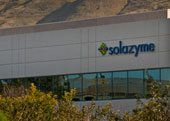As the nascent algae biofuels market ramps up, Solazyme (Nasdaq: SZYM) is also moving forward on other important environmentally responsible products – replacing palm, coconut and other plant oils with algae oil.
World demand for palm oil – used in thousands of products from soap to plastics – is a major driver of the destruction of native forests in Indonesia.
Solazyme announced its first big deal to develop algae oils for the oleochemical industry – a $20 million partnership with Japanese conglomerate Mitsui & Co.
"There’s a strong interest in new sources of oil, particularly one that has a foundation in sustainability," Joseph Zwillinger, director of business development for Solazyme told Todd Woody, a contributor to Forbes.
Solazyme is currently building two production plants in the US and one in Brazil for a total 450,000 metric tons of algal oil capacity. The company believes that, over time, it will be able to compete with palm oil prices.

"Collaborating with Solazyme allows us to develop highly attractive products to penetrate the traditional oleochemicals industry, and expand beyond the supply limitations caused by both regional oil production and constraints in conventional oil profiles," says Daiji Kojima, general manager of Mitsui’s specialty chemicals division.
Major corporations such as Coca-Cola, Ford Motor, H.J. Heinz, Nike, and Procter & Gamble recently joined to replace petroleum-based plastic with 100% from plants. Unilever invested in Solazyme to gain access to its products.
Out of all the cleantech companies, Solzyme is among the most compelling because it’s generating revenue today for diverse product lines, according to Pike Research.
Algae biofuels are expected to grow to a $1.6 billion market by 2015.
Solazyme is the first algae company to list on a major public exchange and its Solajet fuel was used in the first commercial flights to run on algae-based jet fuels. The company has a contract with United Airlines to deliver 20 million gallons of algae-based jet fuel a year, starting in 2014.
Until the biofuels market takes off, Solazyme is also targeting the nutrition market, offering alternatives to eggs, butter and oils, and the cosmetics market.
The chemicals market is very large ($3 trillion a year according to the American Chemistry Council) and is ripe for petroleum substitutes that can reduce greenhouse gas emissions, toxic byproducts, and lack of biodegradability. Chemicals enable production of about 95% of manufactured products in the US. Right now, the majority are made from oil, natural gas and coal.

“”There’s a strong interest in new sources of oil, particularly one that has a foundation in sustainability, Joseph Zwillinger, director of business development for Solazyme…”
Apparently, Mr. Zwillinger doesn’t get out much technically – or know the meaning of sustainability. The Solazyme algae fermentation process is both petroleum and NPK dependent and therefore neither renewable nor sustainable by definition. http://www.reuters.com/article/2012/10/24/us-usa-biofuels-algae-idUSBRE89N1Q820121024
Virtually everything is petroleum and NPK dependent.
Forbes got the production plant details wrong. You might want to double check that.